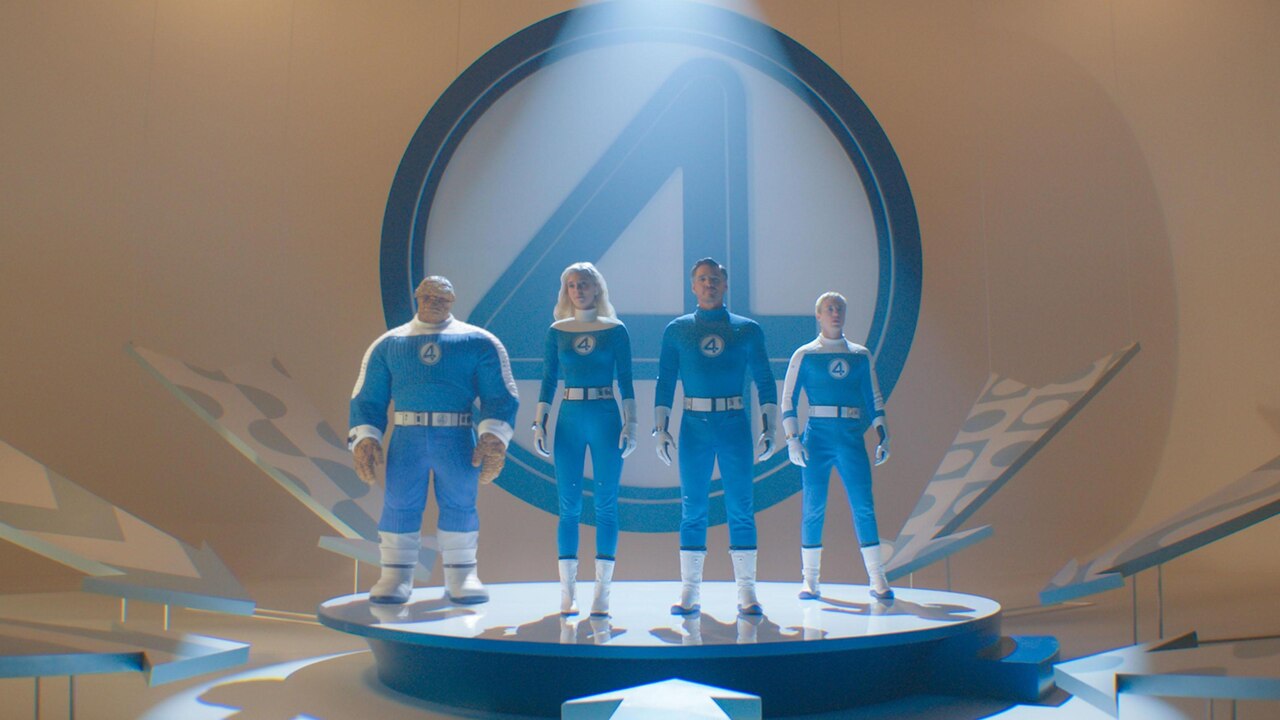
Look at the title of Matt Shakman's The Fantastic Four: First Steps. The words "first steps" are a confession — one of mediocrity, creative bankruptcy, and lack of imagination. Rewind time to the pioneers like Griffith, Renoir, Keaton, and Méliès, who pushed the boundaries of filmmaking when the medium was still new and experimental. Alternatively, you can also consider the four astronauts - Reed Richards (Pedro Pascal), Sue Storm (Vanessa Kirby), Ben Grimm (Ebon Moss-Bachrach), and Johnny Storm (Joseph Quinn) - who embark on and explore outer space in Fantastic Four. In comparison, Shakman merely dips his toes into the world of technology and the cinematic medium (well, to be fair, the production design is the real superhero here). Filmmakers today can tell complex stories through complex methods. Yet, during such modern times, Shakman is still taking...first steps.
Shakman is undoubtedly a man of great talent. He has lent his directorial skills to projects like The Boys, Succession, Game of Thrones, It's Always Sunny in Philadelphia, Fargo, and WandaVision. That last name also belongs to the Marvel Universe, and it was quite creative and emotionally charged—until it boxed itself into superhero clichés and narrative tedium. WandaVision submitted itself to the dull demands of the Marvel studio near the finish line. Fantastic Four, however, accepts defeat from the beginning itself. Shakman's hands are tied and tethered to a formulaic material. No one, including the actors, seems to have a free hand. The performances simply convey the script's intentions. No gesture seems powerful; no expression threatens to break out of the rigid and carefully planned sequence of events. Out of the four actors, Kirby feels extra detached from the material. She probably knows that this is the kind of film that gets its juice from fans' recognition of familiar faces, not dramatic exaggerations. She is right. People who were passive or silent during my screening were screaming energetically during the mid-credits scene when they saw a green-cloaked man. I think these two seconds saved the whole film for them. They got what they wanted.
A character in Fantastic Four named Mole Man (Paul Walter Hauser) says something along the lines of having a sense of humor during times of distress. "Humor" has been an integral part of these films for a long time. I placed the word in double quotes because the banter, over the years, has become labored. This is true for most big-budget franchises. No wonder then that the humor in Fantastic Four is as awkward and artificially manufactured as it is in Jurassic World Rebirth. Have filmmakers forgotten how to be funny? Has comedy, like competent filmmaking, become a thing of the past? This new Fantastic Four lays great emphasis on familial love. Sue gets pregnant. Reed, after learning that he's going to be a father, becomes nervous. They welcome their baby, Franklin, into the world, who immediately becomes the target of Galactus (Ralph Ineson). Sue and Reed, naturally, turn into protective parents. The ordinary citizens depend on the four superheroes for their safety (Ben even entertains a few kids by lifting a car). However, when they receive bad news, they start protesting like teenagers. The relationship between the Fantastic Four and the people of Earth-828 could be interpreted as one resembling that of a parent and child. Furthermore, the backstory of the Silver Surfer (Julia Garner) involves the pain of familial separation. Yet, the movie is devoid of intimacy, camaraderie, and companionship. Shakman employs family values to recycle the same old good vs. evil template, where every outcome is predetermined long before the director shouts, "Action!" This tightly controlled machine leaves no room for spontaneity; its sole purpose is to appeal to a market that is already established and familiar.
The drama in Fantastic Four is like fast food. Shakman wastes the opportunity to build conflict through the plan involving Franklin's role as bait to defeat Galactus. The Silver Surfer's unpleasant past is treated like a footnote, and a brief speech quells the flames of civilian conflict and protest. Ben's feelings of romance, too, are merely hinted at, not convincingly developed. Shakman flies through the story with speed, not accuracy. By the time Fantastic Four ends, you are left wondering: Is that all the movie has to offer? Shakman's superhero adventure serves as the first film in Phase Six of the MCU. Its main objective is to introduce new faces, new superheroes, and new characters. That's something it successfully does. If only this introduction came with a solid story as well as a promise of an enticing future. Alas, the film implies that the 'Marvel'ous strings will not be severed. There's nothing fantastic on the horizon.
Final Score- [3/10]
Reviewed by - Vikas Yadav
Follow @vikasonorous on Twitter
Publisher at Midgard Times
Hi Everyone, after a due consideration, we have decided that we will be open for donations to help us in managing our website. We will be greatful for any kind of amount we receive. Thanks!
— Midgard Times 🎬 (@Moviesr_net) January 4, 2026
PayPal- [email protected] pic.twitter.com/DlNNz5Npm5
Get all latest content delivered to your email a few times a month.
Bringing Pop Culture News from Every Realm, Get All the Latest Movie, TV News, Reviews & Trailers
Got Any questions? Drop an email to [email protected]